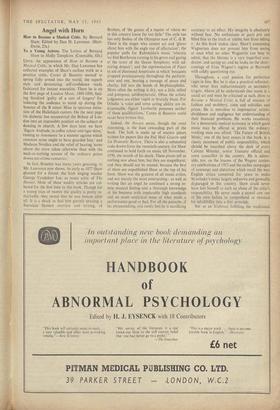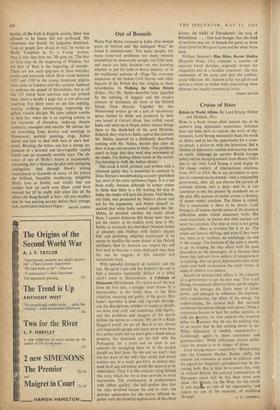Angel with Horn
To a Young Actress. The Letters of Bernard Shaw to Molly Tompkins. (Constable, 63s.) UNTIL the appearance of How to Become a Musical Critic, in which Mr. Dan Lawrence has collected examples of Shaw's earliest work as a prentice critic, Corno di Bassetto seemed to spring fully armed into the world, the superb style and devastating self-confidence ready fashioned for instant execution. There he is on the first page of London Music, 1888-1890, find- ing Stanford 'guilty of a sort of forgery' for inducing the audience to stand up during the Sanctus of the B minor Mass in spurious imita- tion of the Hallelujah custom. On the next page his dialectic has manoeuvred the Bishop of Lon- don into an impossible position on the subject of dancing in church. A few days later we have 'Signor Andrade, in coffee colour and tiger skins,' ranting as Amonasro 'in a manner against which common sense ought to have guarded him,' and Madame Nordica and the relief of hearing 'notes above the stave taken otherwise than with the neck-or-nothing scream of the ordinary prima donna ma ultinza cantatrice.'
In fact, Bassetto was many years gestating, as Mr. Lawrence now shows. As early as 1877 Shaw ghosted for a friend, the Irish singing teacher George Vandaleur Lee, as music critic of The Hornet. Most of these weekly articles are col- lected for the first time in this book. Though for a young man of twenty the quality is pretty re- markable, they reveal that he was human after al!. It is a shock to find him gravely praising a Sterndale Bennett overture and writing, of
Brahms, of 'the genius of a master• of whom we in this country know far too little.' The style too has only flashes of the Olympian ease of C. di B. There is the singer who cannot act and 'glares about him with, the eagle eye of affectation'; the popular puffs for Rubinstein's music 'wherein we find Beethoven turning in his grave and gazing at the score of the Ocean Symphony with ad- miring despair'; and the representation of Faust in aid of distressed Americans at which 'bouquets dropped promiscuously throughout the perform- ance and one, bearing a message of peace and charity, fell into the hands of Mephistopheles.' More often the writing is dry, not a little stilted and pompous, unidiosyncratic. Often the artistic judgments are either vapid or brutally blunt. For Othello 'a voice and some acting ability are in- dispensable. Signor Tamberlik possesses neither of these qualifications.' Corno di Bassetto could never have written that.
Indeed, the Hornet series, though the most interesting, is the least rewarding part of the book. The bulk is made up of mature pieces written for papers like the Pall Mall Gazette and the Dramatic Review. There is also a substantial coda drawn from the twentieth century, for Shaw continued to hold forth on music till November, 1950, the month of his death. These pieces tell us nothing new about him, but they are magnificent, and they should not be missed; because the best of them are unpublished Shaw at the top of his form. Shaw was the greatest of all music critics, and not merely the most entertaining: as well as writing like an angel he combined a strong in- nate musical feeling and a thorough knowledge of his business with implacably high standards and an acute analytical sense of what made a performance good or bad. For all the panache of his phrasemaking, you rarely feel he is sacrificing
accuracy to an effect. His integrity is absolutely without fear. No enthusiasm or parti pris can blind him to the truth or inhibit him from telling it. As this book makes clear, Shaw's consuming Wagnerism does not prevent him from seeing at once what no other Wagnerite can bear tc admit, that the Meister is a very imperfect con• ductor, and saying so; and he looks on the short• comings of Frau Wagner's regime at Bayreuth with coldly questioning eye.
Throughout, a cool passion for perfectior rages in him. But he is also a practical reformer who never fires indiscriminately at secondary targets. Above all he understands that music is a social art and must be criticised as such. How to Become a Musical Critic is full of matters of fashion and snobbery, costs and subsidies and prices. He is merciless to impresarios' artistic shoddiness and negligence but understanding of their financial problems. He works ceaselessly for a democratic musical economy in which good music may be offered at prices the ordinary working man can afford. 'The Future of British Music,' one of the later essays in this book, is classic statement of public responsibility, which should be inscribed above the desk of every Cabinet Minister, senior Treasury official and town councillor in the country. He is admir able, too, on the lessons of the Wagner centen- ary celebrations of 1913 and the earlier campaigns of contempt and distortion which recall the way English critics conspired for years to make Stravinsky's music largely unknown and generally, disparaged in this country. Shaw could never• have lent himself to such an abuse of the critic's responsibility. He never made a sacred cow out of his own failure to comprehend or elevated his infallibility into a first principle.
Yet as an Irishman fulfilling the traditional
destiny of the Irish in English society, Shaw was allowed to be funny but not profound. His cleverness was feared, his judgment dismissed. `Lots of people [are afraid of me],' he writes to Molly Tompkins in To a Young Actress.; 'that is why they hate me.' He goes on, 'The fear of God may be the beginning of Wisdom; but the fear of Man is the beginning of murder.' There are few such epigrams in these everyday letters and postcards which Shaw wrote between 1921 and 1950 to the young American pilgrim who came to London with her sculptor husband to embrace the gospel of Shavianism; but in all the 125 which have survived and are printed here, there is hardly a page that is not alive and touching. For thirty years we see him cajoling, teasing, scolding, entertaining, improving his gifted, volatile disciple. He takes infinite trouble to help her, when she is an aspiring actress, in the mysteries of elocution, make-up, theatre contracts, managers and salaries. He advises her on everything from divorce and marriage to Montessori, portrait painting, dogs, Italian travel and how to deal with bats in one's bed- room. Reading the letters one has a strong im- pression of a devoted and incorruptibly candid friend and an unusually sensible man. The ab- sence of any of Molly's letters is occasionally tantalising, but it thickens the plot with intriguing ambiguities. And through Shaw's writing (reproduced in facsimile in many of the letters) the brilliant, beautiful, maddening, delightful Molly lives so freshly and vividly that you wonder how on earth even Shaw could have resisted her (if he really did) when like all the others she flung herself at him—till you recollect that he was nearing seventy before their strange, rich, ambivalent intimacy began. DAVID CAIRNS







































 Previous page
Previous page